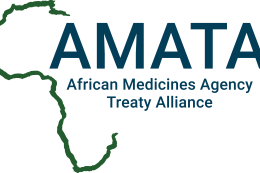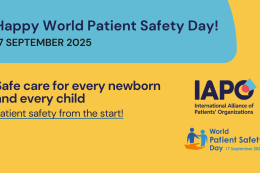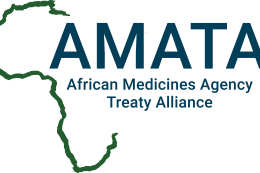Patient involvement in medical education: 'educating-in' patient centredness
 Dr. Matthias Wienold (IAPO Treasurer and Board Member) and Stijntje Dijk (Liaison Officer International Federation of Medical Students Associations (IFMSA))
Dr. Matthias Wienold (IAPO Treasurer and Board Member) and Stijntje Dijk (Liaison Officer International Federation of Medical Students Associations (IFMSA))
Stijntje, whom you all met at our Global Patients Congress 2016, and I held a joint workshop at the Association for Medical Education in Europe (AMEE) Conference in Barcelona, Spain in August 2016.
The workshop titled, “How can I help you to take care of me?” , looked at the contributions and responsibilities of patients in the field of medical education (ME). This article explores the issues raised at the workshop and the wider opportunities that patients need to seize upon to bring about patient centred health care systems globally by ‘educating-in’ the knowledge, skills, attitudes, values and beliefs needed in the physicians of the future.
Background
IAPO has been collaborating with IFMSA at the various World Health Organization Assemblies and Regional Committees since 2015. Our main collaboration has been on the WHO framework on health system strengthening. We have aligned ourselves with IFPMA by advocating investment in medical education and health professional training to improve the quality of health services.
Poorly educated and untrained health staff is now a major bottleneck to the achievement of quality patient centred universal health coverage across the globe by 2030. If we do not have a well-trained patient centred health workforce in place, then many health systems will remain unsustainable, unsafe and unacceptable to our patients. Medical Education (ME) is, therefore, a key concern for all stakeholders planning UHC in line with UN Sustainable Development Goal 3.8.
IAPO, IFMSA and AMEE all agree on the importance of greater involvement of patients in transformative ME; patient involvement must be seen as a vital ingredient in all ME within all medical colleges and teaching hospitals.
Patients, without realizing it, are already transforming young professional lives and minds. You only have to read the memoirs and journals of notable physicians in their later years of life to find instances where a patient has had a massive transformative effect upon the physician. Awakening (1973), by Dr. Oliver Sacks, is one such book and film. Another transformative patient experience is recollected by Dr. Ernesto Guevara in his Motor Cycle Diaries (book and film 1995) and address to medical students graduating from Havana Medical University (1960).
Why have patient involvement in medical education?
Patient experience and perspective is now a very important commodity in health system design and service delivery. The thinking behind this is that patient centredness helps drive up the quality, effectiveness, efficiency and acceptability of health services; this then has ‘participatory dividend’ and a huge impact on health outcomes and health system finance. Weinberger & Johnson (2004) expand on this in The Patient- and Family-Centered Medical Education: The Next Revolution in Medical Education?
The British General Medical Council (GMC) in its paper Patient and public involvement in undergraduate medical education concurs that there is a growing recognition of the fact that patients have a valuable role in their care; this now needs new educational strategies to ensure that students have adequate access to real-life situations where they can develop their skills and attitudes to support this relationship.
The GMC recognizes that patients have a participatory right, not as mere subjects or case studies, as active change agents in the ME programmes. Patients have the right to shape their health systems to fit their needs; this includes shaping the attributes possessed by their newly qualified doctors.
Lastly, with the rise in ‘expert patient’ or ‘expert by experience’ programmes, it has shown that chronically ill patients through having lived with their conditions and treatments for a long time develop clinical insight and knowledge that a junior doctor treating them may not have. The interaction between them during a clinical consultation and examination becomes a two-way knowledge sharing and a learning process. What may not be imparted by the lecturer or course material, the patient will.
What can patient organizations do to improve ME?
IAPO’s declaration on patient centred health care lists the main indicators of a patient centred health care system. We can help achieve this through ME.
Patient organizations (PO) first must become proactive and link up with their local medical education programmes. Talk with the curriculum authorities, teaching institutes and course directors to open up dialogue and discussion.
The most valuable commodity that POs can share with ME decision-makers is their experience and perspective. Patients have a very good idea what kind of health care services and support they need from their physicians. Patients have a very good idea on what are the most effective, skills, attitudes, values and beliefs possessed by physicians. These need to be operationalized into ME curriculum and training.
The workshop on patients’ involvement in ME “How can I help you to take care of me?” brought numerous examples. Patient organizations can involve themselves in curriculum development and delivery, student assessment, quality assurance and governance issues. Individual patients can contribute through the ‘patient voice and story’, teach clinical and communications skills, and co-teach with members of the faculty.
On much wider community schemes, patients can participate in family-attachment schemes, mentoring programmes and other community-based programmes. With the disappearance of ‘house-calls’ now, many physicians cannot appreciate the social and economic determinants of health affecting their patients. These schemes can restore that balance.
What can medical education institutions, course directors, and curriculum authorities do to encourage patients involvement?
The British General Medical Council has prepared a comprehensive strategy for tomorrow's doctors. The Patient and public involvement in undergraduate medical education is a strategy to create an enabling environment by giving a step by step guide how to recruit, prepare, involve, support and manage patients in ME.



